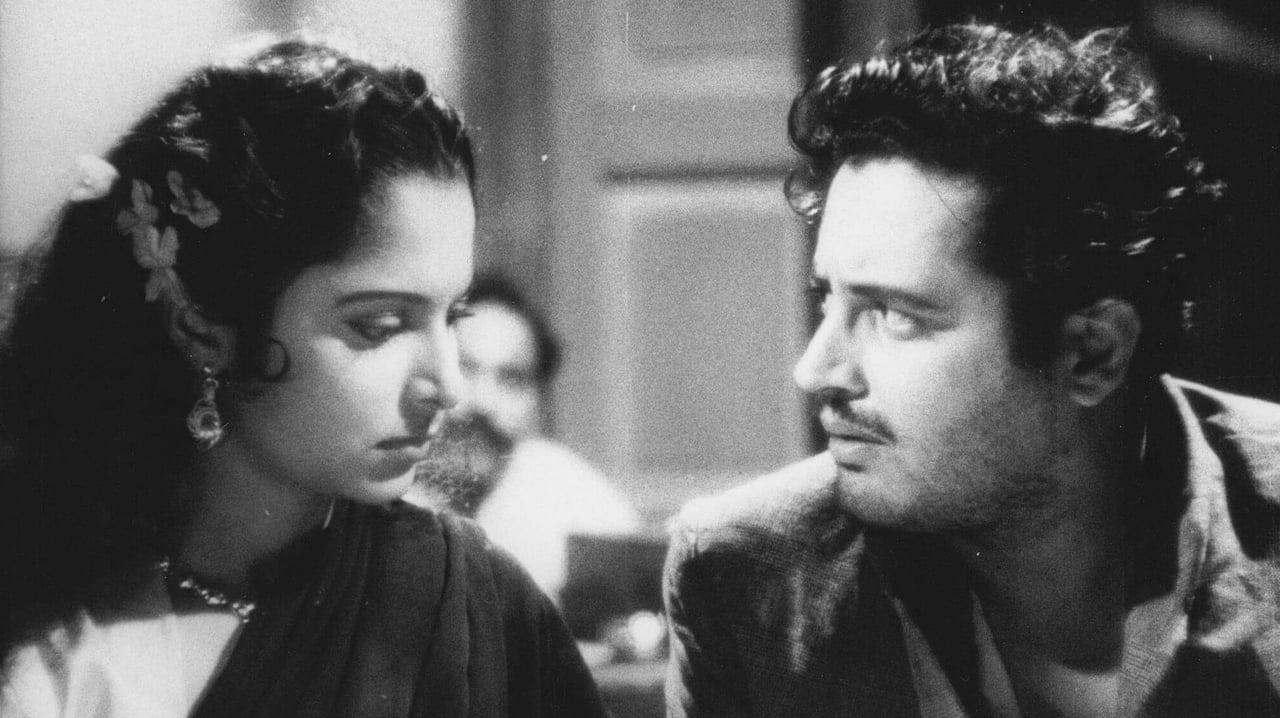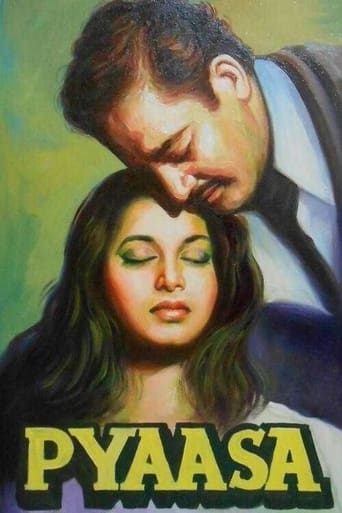

Pyaasa is a 1957 Drama movie directed and produced by arguably the greatest Indian filmmaker of all time, Guru Dutt. Dutt, who pioneered the integration of songs in the movie's narrative as well as the use of close-up shorts in Indian Cinema, is ubiquitously regarded as one of the most influential film-makers of his time. Dutt's avant garde works and his unique style of film-making have been a subject of discussion in various acting and film institutes all across the globe for well over five decades. In Pyaasa, Guru Dutt presents the poignant tale of a struggling poet ostracized by a hypocritical society that faces no qualms in immortalizing the dead, but finds it outlandish to exalt the living. Vijay, educated yet unemployed, epitomizes the hapless state of the Indian youth in the post-colonial India. A consummate artist, Guru Dutt was equally brilliant behind the camera as he was in front of it: his attention to detail as a director matched his ability to emote as an actor. Guru Dutt and his team were keen on casting the king of tragedy, Dilip Kumar in the lead role for Pyaasa, but Dutt himself had to fill in the shoes when an agreement couldn't be reached.Pyaasa, widely regarded as Dutt's magnum opus, represented a departure from the traditional style of film-making in the Indian Cinema, blurring the demarcations that hitherto separated art cinema from commercial cinema. With Pyaasa, Guru Dutt demonstrated for the first time, to both his audience and fellow film-makers, how a balance could be struck between creative aspirations and commercial requirements - a success formula that was completely unknown at that time. Pyaasa, along with Guru Dutt's autobiographical Kaagaz Ke Phool, is currently included in the list of all time greatest motion pictures, both by Time magazine's "All-TIME" 100 best movies and by the Sight & Sound critics' and directors' poll.Pyaasa's intense and thought-provoking plot emphasizes on the fact that every human being, howsoever wretched or deplorable, is capable of love and worthy of being loved. The movie also underlines the root cause of human plight: poverty, not of material but of thought. Guru Dutt, touted in film circles as India's Orson Welles, demonstrates in Pyaasa the might of words - an embodiment of human thought - as great stimuli for change. The stark theme of Guru Dutt's Pyaasa is highly reminiscent of Dostoevsky's Notes from Underground. The vituperative and somber tone of Vijay's poetry seems to betray the same sense of angst and guilt as that of Dostoevsky's Narrator.Vijay's apparent anger for society's hypocritical rigidity is indicative of his inner sense of chagrin for having failed in his efforts to be loud enough to be heard and for quietly accepting his fate. Pyaasa also highlights the complexities associated with the human psyche that give rise to unpredictability of behavior: Vijay, rejected by his lover (Mala Sinha) and family, is embraced by a prostitute, Gulabo (Waheeda Rehman) who is moved by the power of his poetry. While the world finds her despicable and treats her with contempt, she seems to be the only soul capable of reciprocating love and respect. It's both touching and mesmerizing to witness two pariahs of the society finding refuge in each other's abject solitude.As far as the source of Pyaasa's plot is concerned, it's surmised that the movie's story is loosely based on renowned lyricist Sahir Ludhianvi's failed affair with poetess and writer Amrita Pritam. Sahir Ludhianvi's evocative poetry adds real charm to S. D. Burman's soothing music, and indeed it's this synergy that livens up the movie's tempo in spite of its somber theme. The relentless questions that the movie poses to the viewer have the power to make a Polymath look askance at the pool of his knowledge and a Saint jitter in morbid terror. V. K. Murthy's detailed cinematography inexplicably reminds one of Gregg Toland's groundbreaking, brilliant camera-maneuvering techniques in Welles' magnum opus Citizen Kane. The movie's relatively inexperienced cast, hand-picked by Guru Dutt himself, makes most of the opportunity at disposal with almost everyone delivering a memorable performance with special mention of Johnny Walker, Mala Sinha, Waheeda Rehman and Mehmood. The Hindi word 'Pyaasa' translates to 'Thirsty' in English; the movie's plot is highly symbolic of the thirst that troubles the protagonist in form of his yearnings, which gradually take the form of angst and malaise owing to society's indifference and his continuous failure.Overall, Pyaasa is a formidable work of cinema that presents cinema at its finest by maintaining a delicate balance between art and entertainment, thereby serving to be a unique specimen of filmmaking. The movie also marked the beginning of somewhat scandalous association between Guru Dutt and Waheeda Rehman (a lot has been conjectured about Dutt's extra-marital relationship with Rehman... it's still a mystery whether the lovelorn Guru Dutt died of an accidental drug overdose or did he commit suicide). Pyaasa fulfills in its absolute sense the true purpose of cinema: to entertain and enlighten simultaneously. The movie is a must watch for all those who understand and appreciate thought-provoking cinema, and is a great means to get acquainted with Guru Dutt's oeuvre and also with the Classic Indian Cinema.(This review was first published at A Potpourri of Vestiges)
... View MoreThis movie goes on to show what a real poet/artist (basically any truly creative person) should strive to be: Honest above anything else.False recognition, monetary rewards and hypocrisy was banging loudly at the door of art and literature world at the time. This is still true and ever increasing as I see it. Guru Dutt successfully brought out all these in this amazing movie bound together with songs, which are as much rich in terms of lyrics as much in melody.Human emotions and ethics are brought into play to showcase the difficulties an honest artist faces in this two-faced world. This movie also tries to uncover the true nature of love.This is a must watch for everyone - creative or not.
... View MorePyaasa is an unforgettable film till my death. A true gem in the Indian cinema even after 54 years.After seeing it I felt that Guru Dutt is the real superstar in all aspects such as acting, film making etc.Guru Dutt would be my god and Philospher till the death of my life and even after that.Pyassa is an unforgettable film with a flawless script and excellent performance.I had decided to make an awareness campaign about this golden unforgettable classic all over India.Whenever people speak about Hollywood films I had thought why don't we Indian people talk and create awareness about Pyaasa.Pyaasa is a film for every Indian.I feel that Pyaasa should be given the status of a Bible.A must for Young Indians to watch to know about the society.Pyaasa would be always in first place among the unforgettable movies I had seen in my life.Pyaasa is a movie made with heart.Pyaasa has inspired me to live a life with true heart.
... View MoreI saw Pyaasa appear in Time Magazine's list of the Top 100 films of the 20th century. The only other Indian entry was (predictably) Satyajit Ray's Apu Trilogy. My interest in Guru Dutt was piqued. It seems (along with, to some extent, Raj Kapoor) he was amongst the few film-makers of his time who could be appreciated as an auteur. One can (as many have) view this film as highly autobiographical. And it is not a bad film. I hate to add the age-old qualifier "by Indian standards" but it is required here. Dutt and Ray films might be apples and oranges, but clearly Ray's work can compete with foreign auteurs, whilst Dutt can as best be seen as the closest Bollywood came to generating a cross-over talent.Anyways, about the film itself, it has some stellar performances, not least by Dutt himself. Johnny Walker provides his trademark comic relief, as does Tun Tun. The female leads are alright, and the supporting cast (Rehman and Mehmood especially) adds much to the film. The song sequence Dutt portrays (decrying prostitution) while drinking is a tour de force. The fluid camera movements that pepper the length of the film are marvelous. The last act of the film, however, is highly derivative of Preston Sturges' "Sullivan's Travels", and seems to drag on longer than it should.Ultimately, I am impressed enough to seek out more of Guru Dutt's work, including "Kaaghaz Ke Phool" and "Sahib Biwi aur Ghulam".
... View More